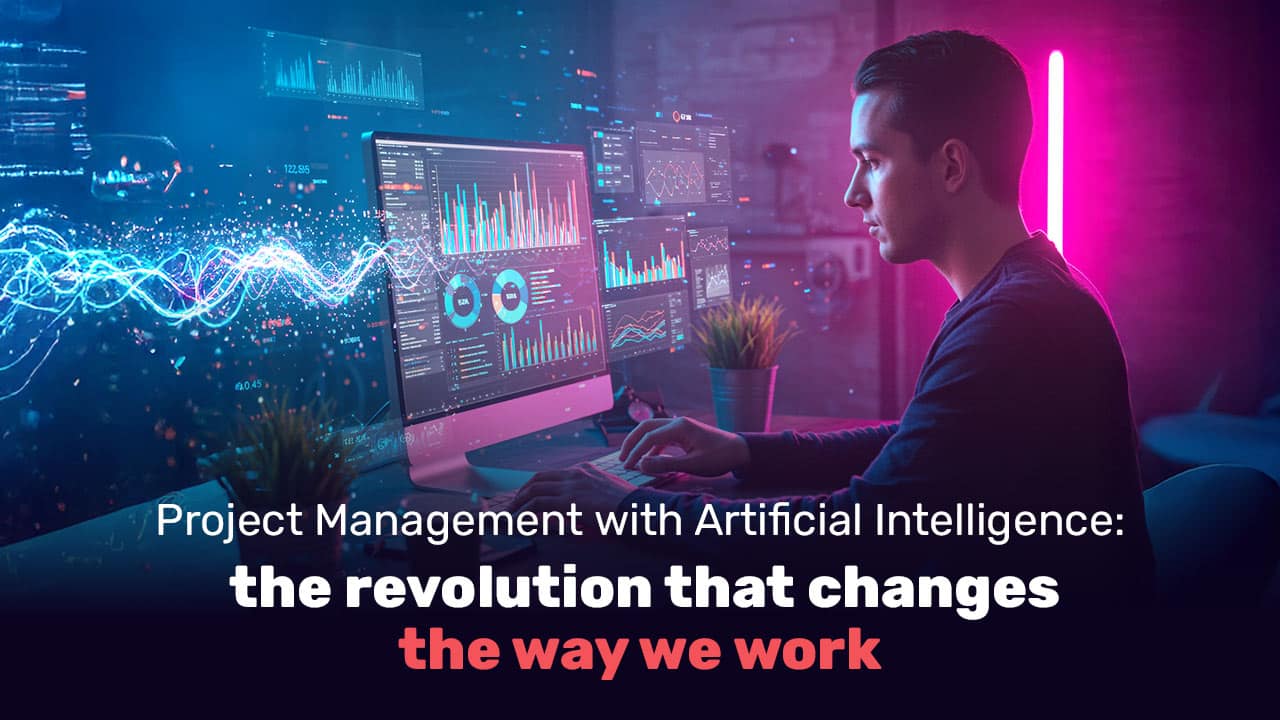Project Management with Artificial Intelligence: the revolution that changes the way we work

Introduction
In 2025, traditional project management is struggling to keep up with the pace of the business world. Deadlines are shorter than ever, requirements change on the fly, and administrative overload wears down teams and distracts them from what really matters: leading, solving, and moving forward. This is exactly where artificial intelligence comes in—not as a technological gimmick but as a tool that delivers a real competitive advantage. AI can scan data at a speed humans cannot match, anticipate failures just before they erupt, and relieve teams of tasks that consume most of their time, fundamentally changing the rules of the game. According to the global Project Management Institute, ninety‑one percent of project managers believe AI will have at least a moderate impact on their work, and fifty‑eight percent expect the impact to be significant or even revolutionary. In today’s complex arena there is simply no room to manage the old way.
How does AI integrate into project management?
AI is changing how projects are managed. It is not just about automating tasks; it enables managers to obtain deep, intelligent, and relevant snapshots in real time. Instead of chasing updates, spreadsheets, and reports, project managers receive immediate detection of risks, schedule deviations, and unrealized opportunities—before they become problems. Predictive models let teams see not only what is happening but what is likely to happen: potential workload peaks, bottlenecks, or failures. The result is smarter and more precise resource allocation, rapid response to events, and adjustments to timelines. Processes supported by AI reduce the need for constant oversight, allowing teams to focus on quality execution rather than putting out fires.
The Monday.com solution for managing projects with AI
What makes Monday unique is not just its use of AI but how deeply it integrates that intelligence into the core of project management, simplifying work without disrupting existing workflows. The platform offers three main components that combine AI capabilities in practical and immediate ways:
AI Blocks: Smart functional units that automate routine tasks such as summarizing meetings, analyzing documents, and identifying bottlenecks. Each action shortens processes and frees up time for meaningful work.
Workforce AI Agents: Digital assistants that monitor task distribution, suggest schedule improvements, and help track performance. They ensure everything happens precisely on time, with balanced workloads and efficient resource allocation.
Predictive Modeling: An advanced forecasting mechanism that allows teams to identify potential delays or unexpected changes and adjust the work plan immediately. Forecasting makes management not only effective but strategic.
The combination of these three components creates a system that understands the workflow, responds in real time, and proactively moves the project forward. At Web3D we have seen this change firsthand: Monday.com has adopted AI and turned it into a daily work tool embedded directly into every management system, performing real tasks that managers and teams deal with every day.
What are the main advantages of AI in project management?
Automation of routine tasks and workflows
One of the clearest advantages of integrating AI into project management is the ability to transform routine processes—once time‑consuming—into automatic, accurate, and consistent actions. Monday’s implementation allows for tasks like status updates, assignment of responsibilities, and approvals according to predefined conditions without having to involve the project manager or team members each time. In practice, this means less time spent on administrative tasks and more time for thinking, problem solving, and advancing strategic goals. Beyond saving time, automation reduces human errors, creates consistency in processes, and maintains a continuous pace of work, especially in multi‑participant projects. Tasks that previously required close supervision and manual information transfer now happen transparently, intelligently, and under control. The result is workflows that move forward without getting stuck on small but critical tasks.
Improving communication and alignment
Projects often stall or fail not because of technological issues but because of poor communication. When team members are not in sync and do not align their understanding, information gets lost and decisions are made based on partial assumptions. Monday AI addresses this issue by providing tools that promote coordination, transparency, and clarity. A key capability of the system is analyzing information from correspondences, reports, and documents and producing immediate insights that replace long explanations or endless meetings. It automatically summarizes discussions and generates real‑time reports clarifying the true status of each task. Instead of relying on gut feelings or guesses, the team has all the necessary data—consolidated, accessible, and available. This is a fundamental shift: no more misalignment or “I didn’t see that,” but a uniform communication flow based on data rather than interpretations.
Risk identification and prevention
Risk management is not just about reacting to problems; it is about identifying them in time, long before they disrupt the project. Monday AI operates exactly in this space. It continuously monitors project data, detects deviations in schedules, unbalanced workloads, or potential bottlenecks, and provides precise alerts rather than general warnings. The system can analyze dependencies between tasks, spot imbalances in workload distribution, and propose actionable solutions such as changing priorities, reallocating resources, or adding staff. This approach leads to proactive management, which does not wait for issues to arise but acts so that they do not occur in the first place. For example, if a delay in an important task arises due to its dependence on another task, the system will recognize this in advance and recommend actions such as rescheduling or bolstering the team. The outcome is steady workflow, fewer unexpected failures, and rapid, data‑based responses.
Optimizing resource allocation
Proper allocation of resources is a recurring challenge in any project and relies on balancing availability, skill level, and avoiding burnout. Monday AI offers a smart control layer that helps project managers understand in real time who can take on another task and when someone’s load should be reduced. The system continuously scans each team member’s workload, the match between task and person, and existing schedules, then offers suggestions adapted to reality. For example, if a team member is approaching overload, Monday will spot this and recommend transferring the task to another available person with the right profile.







